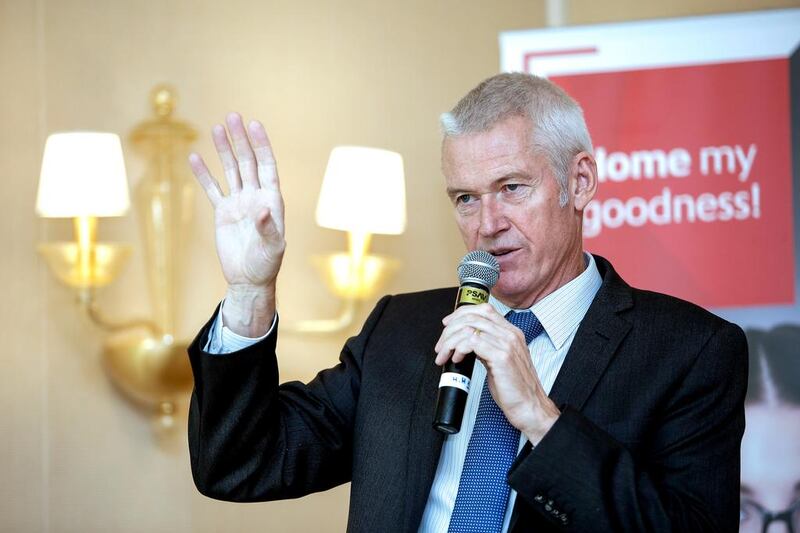Bank lending growth will remain subdued this year with business confidence yet to fully recover, according to the chief executive of RAKBank.
But the worst of the bad debt crisis that plagued small and medium-sized enterprises (SMEs) over the past year is over, said Peter England, the chief executive of RAKBank, the biggest SME lender in the UAE.
Mr England said that loan growth for the bank this year is likely to drop sharply to low single digits from the 10 per cent gain last year as not just small businesses but individuals shy away from tapping debt until the outlook for the economy, hurt lower oil prices in recent years, becomes clearer.
“It appears we’ve hit the bottom and that things are starting to improve,” Mr England said at a conference in Dubai yesterday.
“There’s no question, however, it’s a challenging time. We’ve been very exposed to the small business market and the small business market has been extremely challenging over the past 12 months. We are, though, seeing some signs of improvement.”
Mr England said those improvements could be seen in the financial health of businesses and their ability to pay back debt. At the same time the amount of money the bank sets aside to pay bad debt is also tapering off after a tough year, he said.
RAKBank said last month that its second-quarter net income fell by almost 45 per cent as money set aside for loans gone sour almost doubled.
Provision for impairment of loans and advances rose to Dh437.1 million in the second quarter from Dh233.8m in the same period last year. The bank said at the time that payment defaults mainly came from unsecured loans and loans to SMEs.
Abdul Aziz Al Ghurair, the chief executive of Mashreq and head of the UAE’s Banks Federation, warned in November that a number of small business owners may have skipped town, leaving about Dh5 billion of unsettled loans. In May, however, Mr Al Ghurair said the potential fallout from rising levels of bad debt in the small and medium enterprise sector had been contained, as banks restructure some of those loans.
The expected rise in interest rates this year could also deter consumers from taking on new debt and make mortgages more expensive. A hike could “cause banks to become more reluctant to lend”, Capital Economics said in a note this week.
While RAKBank has been best known for retail banking and especially its big credit card business as well as SME lending, it wants to branch out more and more into stable sources of income where returns and risks are fewer.
Mr England said that as a result the bank was pushing for growth in areas such as lending to bigger businesses as well as home loans for individuals. This week the bank launched a mortgage product for individuals that seeks to give discounts to customers if they combine it with a current account. The product is geared towards getting customers to undertake more of their banking with RAKBank – what is called “relationship banking” – rather than having multiple bank accounts.
RAKBank has a 12 per cent market share of mortgages in the UAE but is hoping its latest initiative will help it to double its stake of property loans, Mr England said.
“It’s a long-term play. In the longer term, the bank should be more relationship-focused rather than product, product, product,” he said.
mkassem@thenational.ae
Follow The National's Business section on Twitter





